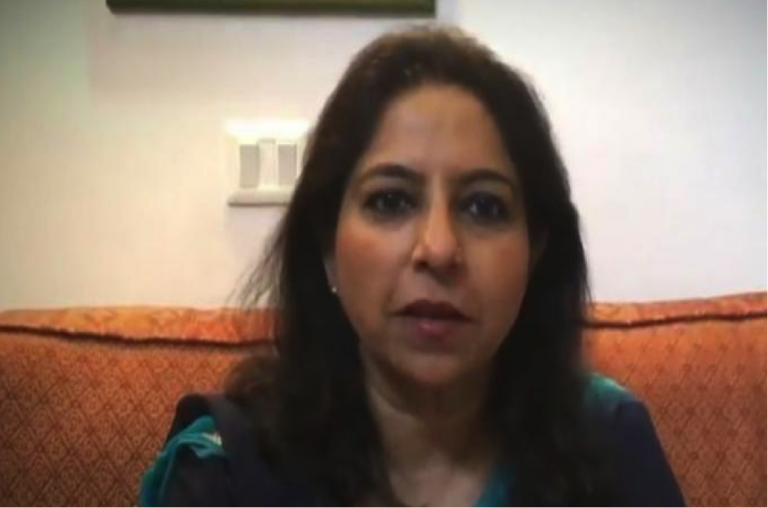
Maneka Guruswamy
Life of Menaka Guruswamy
Senior Advocate at the Supreme Court of India, Menaka Guruswamy was born in Hyderabad, India on 27 November 1974. Guruswamy is the daughter of Meera Guruswamy and a former strategist for the Bharatiya Janata Party and Special Advisor to Union Finance Minister Yashwant Sinha.
Guruswamy holds advanced degrees in law from the National Law School of India University, Harvard Law School, and the University of Oxford. Hyderabad Public School served as her primary educational institution, and Sardar Patel Vidyalaya in New Delhi served as her high school. After which in 1997 she pursued B.A.LL.B. (Hons) from the National Law School of India University in Bangalore. She was a Harvard Gammon Fellow and an Oxford Rhodes Scholar. At Yale Law School, the School of Law at New York University, and the Faculty of Law at the University of Toronto, she has served as a visiting professor. She taught constitutional design in post conflict democracies at Columbia Law School from 2017 to 2019 as the B.R. Ambedkar Research Scholar and Lecturer in Law.
She is renowned for having had a substantial impact on numerous Supreme Court precedent-setting cases, such as the Section 377 case, the case bureaucratic reforms, the Augusta Westland bribery case, the Salwa Judum case, and the case involving the right to education. She is acting as amicus curiae for the Supreme Court in the case involving the alleged extrajudicial executions of 1,528 people in Manipur. Guruswamy filed a petition on behalf of five LGBT petitioners in the Navtej Singh Johar case, which criminalises consenting same-sex relationships, alongside a group of attorneys that included Arundhati Katju and Saurabh Kripal. Guruswamy and Katju acknowledged that their triumph was both professional and personal.
Menaka Guruswamy has been part of the following cases:
1. Navtej Singh Johar v. Union of India (2018)
Section 377 was declared illegal by the Supreme Court of India’s five-judge panel, which reached this conclusion unanimously. The court also reversed its earlier ruling in the Suresh Koushal v. Naz Foundation case. The Supreme Court of India ruled that homosexuality is no longer a crime and that everyone in India is guaranteed equality before the law or equal protection under the law under Article 14.
2. Society for Unaided Private Schools of Rajasthan v. Union of India (2012)
Section 12(1)(c) of the Right of Children to Free and Compulsory Education Act, 2009, was challenged in this case as being unconstitutional. The Court upheld the mandated quota’s constitutionality as it relates to public and private schools. Therefore, the Court determined that it is constitutional for the government to demand that private schools set aside 25% of their admission spots for children from underprivileged families.
3. Nandini Sundar & Ors v. State of Chattisgarh (2011)
In order to combat Naxalite violence in the area, Salwa Judum was a militia that was organised and sent into action as part of anti-insurgency operations in Chhattisgarh, India. The militia was ordered to be disbanded by the Supreme Court after it was ruled to be illegal and unconstitutional. Unconstitutional because Judum paid the police pittance and provided them with weapons, in violation of Articles 14 and 21. The Chhattisgarh government has been ordered by the court to retrieve all of the weapons, ammunition, and accessories.
4. S.K. Jain v. Union of India (2014)
The Enforcement Directorate (ED) detained Delhi Health Minister Satyendar Jain in connection with a money laundering investigation involving a business in Kolkata. The ED discovered through its probe that companies Satyendar Jain owned and managed got Rs 4.81 crore from shell companies between 2015 and 2016. It was an Indian political and financial scandal involving payments transmitted through four hawala brokers, specifically the Jain brothers, which were allegedly made by politicians.
5. T. S. R. Subramanian & Ors. v. Union of India and Ors. (2013)
Invoking Article 32 of the constitution, T.S.R. Subramanian, a former cabinet secretary, and 82 other retired bureaucrats from the IAS, IPS, and IFS filed a public interest lawsuit in front of the Supreme Court. The goal of the petition was to shield the bureaucracy from political meddling and prevent the practice of political bosses frequently transferring civil servants. The Supreme Court of India decided that civil officials were not required to heed oral orders.
6. AgustaWestland case
The AgustaWestland chopper fraud occurred during the second term of the Congress-led United Progressive Alliance (UPA) Congress-led government. In 2010, the UPA government signed a contract to procure 12 AgustaWestland VVIP helicopters to carry the Indian President, Prime Minister and other key dignitaries. The whole deal was Rs 3,600 crore. The bribery involved in the VVIP Chopper deal was proven in court and even the rules were broken.





